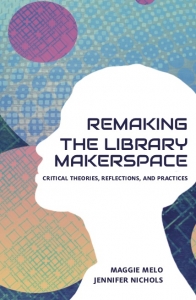Centering voices from the margins: Unsettling the exceptionalist lore of makerspaces
Jennifer Nichols, University of Arizona & Maggie Melo, University of North Carolina Chapel Hill
Tuesday, September 15, 2020: 1-2 pm PDT (Zoom/Online)
This talk centers on the limitations and challenges emerging from this particular brand of “maker culture,” and emphasizes the critical work that is being done to cultivate anti-oppressive, inclusive and equitable making environments. The Maker Movement has inspired hundreds of public, school, and academic libraries to integrate makerspaces into their own ecosystems. This social phenomenon purports an enthusiasm and techno-optimistic approach to engaging with the world with STEM-rich technologies, and consistently overshadows the material limitations and drawbacks that this movement simultaneously purports. The Maker Movement has popularized a narrow, classist, predominantly white, and heteronormative conceptualization of maker culture. Makerspaces, like libraries, are not neutral, but rather are imbued with ideologies stemming from Silicon Valley that consequently dictate who makes, why making occurs, and what is considered making. Specifically, this talk will highlight the voices within the edited collection, Re-making the Library Makerspace Critical Theories, Reflections, and Practices. The book captures how librarians and educators have disrupted and re-made their makerspaces in response to the constraints of the Maker Movement’s “makerspace.” This collection extends a critical examination of library makerspaces at the site of praxis with critical considerations around race, age, class, gender, sexuality, power, and ability will be centered in this volume.
View more and register online!

 The Maker Movement is a social phenomenon that has generated excitement around tech-centric making and learning throughout the world since the mid-2000s. Hailing from Silicon Valley, the Maker Movement has inspired hundreds of libraries across the US to integrate makerspaces into their own ecosystems to further support users’ learning and discovery. While the affordances of the Maker Movement have been highlighted extensively over the past decade, the limitations and drawbacks of this movement have been largely overshadowed. The Maker Movement has popularized a narrow, classist, predominantly white, and heteronormative conceptualization of maker culture. Makerspaces, like libraries, are not neutral, but rather are imbued with ideologies stemming from Silicon Valley that consequently dictate who makes, why making occurs, and what is considered making. This edited collection centers the limitations and challenges emerging from this particular brand of ‘maker culture,’ and emphasizes the critical work that is being done to cultivate anti-oppressive, inclusive and equitable making environments.
The Maker Movement is a social phenomenon that has generated excitement around tech-centric making and learning throughout the world since the mid-2000s. Hailing from Silicon Valley, the Maker Movement has inspired hundreds of libraries across the US to integrate makerspaces into their own ecosystems to further support users’ learning and discovery. While the affordances of the Maker Movement have been highlighted extensively over the past decade, the limitations and drawbacks of this movement have been largely overshadowed. The Maker Movement has popularized a narrow, classist, predominantly white, and heteronormative conceptualization of maker culture. Makerspaces, like libraries, are not neutral, but rather are imbued with ideologies stemming from Silicon Valley that consequently dictate who makes, why making occurs, and what is considered making. This edited collection centers the limitations and challenges emerging from this particular brand of ‘maker culture,’ and emphasizes the critical work that is being done to cultivate anti-oppressive, inclusive and equitable making environments.